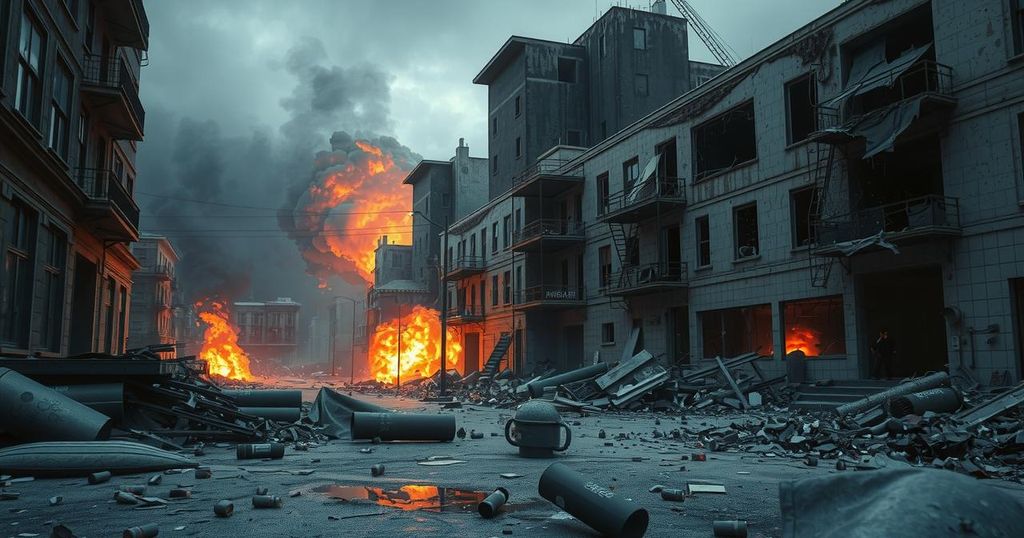Crime
AFP, ARMANDO BENEDETTI, ASIA, CALI, CARLOS FERNANDO TRIANA, CENTRAL GENERAL STAFF, COLOMBIA, CORINTO, CRIME, CUBA, ELIZABETH DICKINSON, EMC, FARC, GANG VIOLENCE, GUA, GUN VIOLENCE, INDIA, INTERNATIONAL CRISIS GROUP, LUZ AMPARO, MIGUEL URIBE, NATIONAL POLICE, NORTH AMERICA, PROTESTS, SOUTH AMERICA, VIOLENCE
Marisol Gonzalez
0 Comments
Seven Dead as Colombia Hit with Wave of Bombings and Gun Attacks
Colombia suffered from coordinated bomb and gun attacks that resulted in seven deaths, primarily impacting Cali and nearby towns. The National Police suspect involvement from a local guerrilla group, raising fears of returning violence reminiscent of past decades. High-profile attacks, including an attempted assassination of a senator, have intensified the security crisis, highlighting the government’s struggle to reach peace amid rising tensions.
CALI, Colombia — A series of coordinated bombings and gun assaults swept through southwestern Colombia on Tuesday, leaving at least seven individuals dead. This alarming escalation in violence exacerbates the security crisis currently affecting the nation, which has a turbulent history with similar attacks.
The assailants targeted several locations, including police and municipal buildings, throughout Cali, Colombia’s third-largest city, and adjacent towns. National Police chief Carlos Fernando Triana reported that the attackers, believed to be affiliated with a local guerrilla group, utilized an arsenal of weaponry including car bombs, motorcycle explosives, rifle fire, and even a suspected drone.
Triana confirmed the death of two police officers among the deceased, with police later reporting a total of seven fatalities and 28 injuries. As journalists from AFP surveyed the scene, they described the damaged landscapes in Cali and surrounding areas like Villa Rica, Guachinte, and Corinto, where remnants of vehicle bombs laid scattered amid the wreckage.
The timing of these assaults is particularly troubling, as they follow just days after an assassination attempt on presidential candidate Miguel Uribe in Bogota. A palpable fear of spiraling back into the violence reminiscent of the 1980s and 1990s is spreading among the populace, a time marked by rampant cartel wars and political murders.
Interior Minister Armando Benedetti revealed that the government had received unverified intelligence hinting at guerrilla involvement in the recent attempt on Senator Uribe’s life. The attacks themselves have been described as a well-orchestrated offensive, suggesting a high level of coordination among the attackers. Elizabeth Dickinson, a security analyst with the International Crisis Group, noted that the current violence is likely linked to the Central General Staff (EMC), a faction that has emerged from the remnants of FARC.
“This is a particularly well-coordinated offensive,” Dickinson emphasized. She pointed out the group’s ability to engage in operations within urban areas like Cali raises significant alarm. Past peace negotiations initiated by President Gustavo Petro with the EMC and other armed factions have repeatedly faltered, deepening the crisis further.
The EMC seems to be intensifying pressure on the government, with strategic strikes that could potentially deter ongoing military operations targeting their ranks, particularly following reports of serious casualties among their leadership, including their veteran leader known as “Ivan Mordisco.” “They are trying to raise the cost of that military initiative for the government,” Dickinson insisted.
Moreover, the EMC issued a warning to civilians urging them to steer clear of military and police sites, though they stopped short of directly claiming responsibility for the attacks. The urgency of the situation escalated with the assassination attempt on Uribe, who was shot twice in the head while campaigning; a 15-year-old suspect has been arrested but has pleaded not guilty, adding more fuel to the general unease within the country.
President Petro’s statements on social media have stirred additional controversy, suggesting that the attack on Uribe may have stemmed from an international “mafia” and raising questions regarding the handling of Uribe’s security detail prior to the shooting. Citizens across Colombia are left in shock as the situation continues to unfold with both fear and speculation about the underlying motives and those behind the recent wave of violence.
The violent attacks across Colombia have left seven people dead, illustrating the resurgence of security threats tied to guerrilla activity. The coordinated nature of the bombings and shootings has invoked a deep-seated fear of returning to the violence of previous decades. The government’s struggle to negotiate peace with groups like the EMC further complicates the situation, as the nation grapples with rising insecurity and political turmoil following high-profile assassination attempts. The ongoing developments warrant serious scrutiny as the Colombian people navigate this troubling period.
Original Source: globalnation.inquirer.net




Post Comment